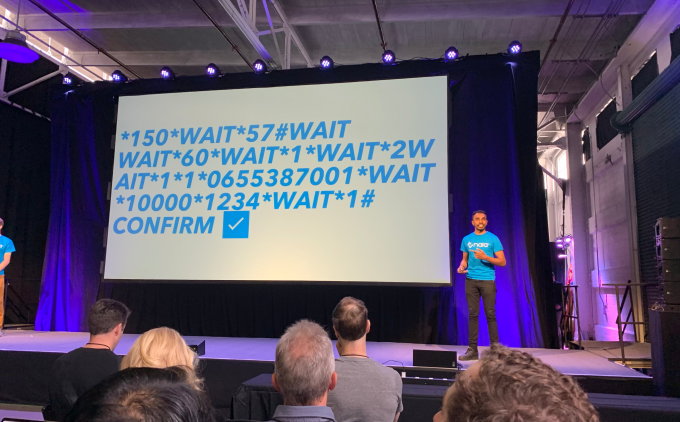Startups
All 88 companies from Y Combinator’s W19 Demo Day 2

Today was the second half of Y Combinator’s two-day Demo Day for its Winter 2019 class. Over 85 startups pitched on stage yesterday, and another huge batch launched today.
Previously held at the Computer History Museum in Mountain View, this YC Demo Day instead took over a massive warehouse in San Francisco. Like yesterday’s pitches, today’s were split across two stages (“Pioneer” and “Mission”) running in parallel — so even if you were there, you couldn’t see everything alone. We picked our top 10 startups from Day 1 to make it easier to keep up.
Here are all of the companies that launched today, and our notes from their presentations.
YSplit: Splitting utility bills and other recurring payments with roommates or loved ones is a huge pain where one person has to front the money and then nag the others to get paid back. YSplit offers virtual debit cards that make it easy to automatically split bills and collect cash from users’ bank accounts. By charging a 2 percent interchange fee to merchants, YSplit could build a solid business from the 26 million shared homes in the US alone.

The Juggernaut: A subscription publication focusing on South Asian stories. They hire freelance writers, publish one story per day, and charge users $5 a month. We wrote about The Juggernaut here.
Searchlight: Reference checks can screen out bad hires, yet many businesses wait until the very end of the interview cycle or don’t do extensive checks. Searchlight offers reference checks as a service. Job candidates invite their references to submit testimonials, which Searchlight collects and organizes into reports about someone’s work style, ideal environment, and skillset. Searchlight earns an average of $250 per job hopes to investigate all 30 million skilled hires in the US per year.

Allo: Connects local parents and helps them help each other with things like babysitting and errand-running through a “Karma” point system. Average user returns 12x per week.
Coursedog: Universities employ full time scheduling administrators to place faculty into courses and rooms. Coursedog automates this process by plugging into a school’s data to eliminate this busy work. Coursedog already has 8 university clients paying over $100,000 for a three-year contract. Next it wants to move into modernizing the process of booking spaces on campus as well as instructor and tuition payments.
AI Insurance: Cloud-based software for insurance claims. By moving things to the cloud rather than filing cabinets, the founders say they can save “thousands of hours per claim”. Their goal, once they’ve got enough claim data, is to use AI to determine things like how much a claim might ultimately cost.
Nebullam: Growing crops indoors can produce more food per acre that’s not dependent on weather, but the problems are the high labor costs and payback times for expensive equipment. Nebullam wants to be the John Deere of indoor farming. It sells a vertical farming cube and other equipment that can maximize yield and minimize costs. With a CEO who grew up on a farm, it’s already managed a 3 year payback time for its equipment vs an industry standard for 7 years.

Pronto: Ride-sharing for smaller cities in Latin America. Co-founder Miguel Martinez Cano says that the Uber model doesn’t work in these cities, as would-be riders don’t have credit cards and instead want to pay cash. Drivers pay a subscription fee of $59-99 per month. Currently doing 62,000 trips per month.
LEAH Labs: People spend $500 million per year on chemotherapy for their dogs, even though the treatment only extends their life temporarily without curing their disease. LEAH Labs wants to cure B-cell lymphoma cancer in dogs using Car T cells, a powerful new treatment method. There have been $20 billion in recent Car T cell company exits, but none of the big players are focused on dogs. LEAH Labs falls under the USDA instead of the FDA, so it requires less investment to get approved, which translate into $5,000 treatments.
Balto: A platform for fantasy sports league managers to make money from their work. As fantasy sports betting moves toward legality in more states, they want to capture the audience already making bets through other means.
Visly: Developers waste a ton of time rebuilding the same product for iOS, Android, and web and Visly says only 15 percent of developers use tools to simplify this. Visly’s cross-platform UI development suite makes it quick and easy to create consistent apps for different devices. The CEO worked on Facebook’s version called Yoga, but it never achieved full compatibility with the web.”.. Visly has fixed those problems so developers can focus on their invention, not porting it to other operating systems.
Mudrex: Lets people do algorithmic trading without programming knowledge, beginning with cryptocurrency. Last week, they saw a trading volume of $150,000. They charge users $300 a year for access to a drag and drop interface for building trading models, which the user can then test against historical trading data.

Brain Key: Diagnosis for brain diseases using 3D MRI data. Whereas many doctors use 2D slices from MRIs for diagnosis, Brain Key says they’re able to analyze data in 3D to do things like identify Parkinsons subtypes 35% more accurately than experts. They’re aiming to be in hospitals worldwide within 2 years.
Switchboard: It’s tough to efficiently match available trucks with freight needing to be shipped if you don’t know where the trucks are. Switchboard’s on-board truck sensors collect real time data on a truck’s location, destination, and more. Switchboard’s trucking freight marketplace launched three months ago and is already gathering data that could unlock more revenue streams.

Shef: Two months ago, California passed the first law in the country legalizing the sale of home cooked food. Shef creates a marketplace where home chefs can find nearby customers. Shef’s meals cost around $6.50 compared to $20 per meal for traditional food delivery, and the startup takes a 22 percent cut of every transaction. It’s been growing 50 percent week over week (Correction: we previously wrote “month over month”; YC tells us that growth was week over week) thanks to deals with large property management companies that offer the marketplace as a perk to their residents. Shef wants to be the Airbnb of home cooked food.
Qwest: Lets people pay money to skip lines at venues like clubs and bars. They’re currently at 10 venues in 2 cities, and say they should be at 100 venues in 6 cities this year. They aim to expand to events like music festivals and sporting events.
Circumvent Pharmaceuticals: Brain disease Batten, the Alzheimer’s of children, has no adequate treatment. Circumvent says its treatment can replace the missing enzyme at the root of the disease and has already been shown to be effective in mice. If it can get through expedited approval thanks to incentives for treating rare diseases, Circumvent wants to sell its medicine for $100,000 which is covered by insurance. Once it clears that hurdle, Circumvent will be much closer to working on Alzheimer’s treatments which could be hugely lucrative and a big win for humanity.
Withfriends: Membership programs for small businesses like bars, theaters, and barbershops. So far they have 80 small businesses on the platform, with over 5000 members working out to $400,000 in revenue. By integrating right into PoS machines, they say 15% of customers convert into members.
Askdata: Non-technical employees rarely use company data because it’s difficult to find and understand. Askdata offers a natural language search engine for internal data that translates words into SQL queries. Making data conveniently accessible could help businesses make better decisions.
Modern Labor: Pays people $10,000 to learn to code in exchange for 15% of their income for 2 years thereafter. Founder Francis Larson says Modern Labor’s first group of students is going through the program now, with 10,000 students on a waiting list.

NALA: Making mobile payments in Africa can require an internet connection and typing in a complex 46-digit code like the one above. NALA makes a mobile money app for easily paying friends and merchants as well as buying Internet airtime to capture the $300 billion in yearly mobile payments in Africa. Co-founder Benjamin Fernandes says NALA is 7X faster than competitors and has 5,000 active users. NALA earns money off commissions on airtime and bill payments, interest on savings, sending leads to insurance companies and other services.
Vice Lotteries: A lottery platform that’s trying to “take the loss” out of lotteries. Amongst other things, they limit the bets users are allowed to make based on their wealth to prevent betting too much. Founder Matthew Curtis notes that their model is currently not legal, but they’re actively trying to change that.
GoLinks: Long, complex URLs make it tough to access internal company tools. GoLinks makes links short and easy to remember for clients like Reddit and Lyft. Its tool can programmatically generate URLs that are single sign-on compliant, and teams get a dashboard of analytics. Whether employees are setting up a new computer or working while traveling, GoLinks means they won’t be locked out.

Allure Systems: Fashion brands spend $8 billion per year on models and photographers. Allure Systems uses AI to programatically produce apparel images for shopping sites. The technology can take one photo of a jacket and show it in a variety of poses on a range of models across different sizes. By increasing shopping conversion rates by 14 percent, the team has already racked up $1.4 million in annual recurring revenue with an average SAAS contract costing over $200,000 per year.
Spiral Genetics: Software built to compare large sets of human genome data to help cure diseases. Founder Adina Mangubat says existing software can’t analyze genome data at the massive scale it’ll be at in the coming years. They’ve generated $250K in revenue so far, with $1M in Letters of Intent.
Rune: Voice chat and automated friend/squad finder for players on mobile games (like Fortnite, PUBG.) In 10 days since launch, the company says it’s got 5,000 users who spend an average of 30 minutes per day on the platform. Friendships are handled within Rune, allowing users to switch from game to game.
Truora: Truora offers fast and reliable background checks for Latin America at $3 per check. Truora also collects reports of fraud by workers from its clients to create a valuable database employers will pay to access. It already has Uber, Rappi, and other top regional marketplaces using their service.

Aura Vision: Like Google Analytics for physical stores. By pulling a video feed from “any camera” in a store, Aura provides customer age, gender, and how long customers have lingered with a method they say is anonymous and doesn’t require facial recognition. The company founders say they’ll charge stores an average of $9,600 per year.
GeoPredict: GeoPredict aims to remove the middlemen from oil and gas real estate sales, and use AI and historical data to help evaluate acreage. They transacted roughly $100,000 last week, and charge a 5% fee.
Union Apartment: It’s hard for international students to find housing if they don’t speak the language, don’t have local friends, and might not even have a bank account. Union Apartment offers furnished co-living apartments for international students starting with those from China. Beyond dwellings, Union Apartment provides events like karaoke nights and services like help with banking. It’s already profitable with $130,000 in gross profit in February which makes this a $24 billion gross profit potential business.
jet.law: Charges flat legal fees for employment litigation, using court records to predict the workload and how much they should charge up front (rather than charging by billable hours). Co-founder Jesse Unruh previously worked in big business litigation, while co-founder Kyle Harris was a manufacturing design engineer at Apple.

Friendshop: Friendshop lets you recruit friends to buy with you to get deals. Friendshop wants to be the US version of Pinduoduo, a $24 billion Chinese group buying company. And after its virality helps Friendshop grow in beauty, it plans to move into other consumer goods businesses.
Pulse Active Stations Network: Health kiosks for India, meant to be installed in train stations. Co-founder Joginder Tanikella says that there are 600,000 preventable deaths in India as many in the region don’t get regular doctor checkups. “But everyone takes train,” he says. Their in-station kiosk measures 21 health parameters. The company made $28,000 in revenue last month. Charging $1 per test, Tanikella says each machine pays for itself within 3 months. In the future, the kiosks will allow them to sell insurance and refer users to doctors.
Pyxai: Employers don’t have scalable ways to screen for soft skills and culture fit. Pyxai gives job applicants a 30 minute quiz that it analyzes with natural language processing to assess what they can do and if they’ll mesh with existing staff. Deemphasizing resumes could decrease discrimination in hiring. Pyxai charges $6 per screening and wants to be part of how all 36 million knowledge job openings get filled.
Mage: An app built specifically for buying and selling cards from Magic: The Gathering — the largest trading card game in the world. Aiming to do for Magic what GOAT did for shoe resales, their app scans, recognizes, and prices cards and helps users to list them. The company says their average customer spends $120 per month on Magic cards.
Geosite: Businesses that need satellite imagery have to piece it together from 40 providers, manually download the content, and upload it to their system. Geosite is a marketplace for immediately usable spatial imagery. Clients pay an annual fee, and Geosite already has $3 million in contracts with the US Air Force.
Community Phone: Community Phone aims to be a friendlier wireless carrier, aggregating three existing wireless networks behind a company focused on a positive customer service experience. Co-Founder James Graham says they’re currently seeing $230k in annual recurring revenue, and are profitable with a 45% margin.

Superb AI: To build artificial intelligence, you need accurately labeled training data, but services like Mechanical Turk can be slow and inaccurate. Superb AI has built an AI that assists in the labeling process to speed it up 10X, and creates its own in-house AI algorithms. Superb AI has already done $1 million in revenue in the past 7 months. For most businesses to keep up with the AIs from Google, Facebook, and the other tech giants, they’ll need help generating training data that Superb can provide.
Termius: Termius makes an SSH client that works on desktop and mobile and already has 11,000 paying customers including employees at Disney and NASA. The freemium business model is propelled by its #1 ranking in app stores for “SSH”. Next, Termius wants to expand to teams to become a full collaboration platform.
Verto FX: Helps businesses in Africa obtain foreign currencies needed to work with international companies. They currently support the exchange of 18 currencies. The company has seen $26M transaction volume in 5 months of private beta, with $30k monthly revenue. Co-founders Anthony Oduwole and Ola Oyetayo both have backgrounds in building technology platforms for large banks.

Inito: This app lets you measure fertility hormones using a hardware dongle that plugs into your phone. Inito can perform a hormone test and use that data to diagnose and treat conditions, and aid in planning procedures like IVF and IUI. Inito claims it can help people get pregnant faster while earning a 65 percent margin on its hardware, and that its data could help diagnose illnesses earlier.
Woke: Finances ad campaigns for budding eCommerce brands and helps them grow in exchange for a cut of the profits. In one month, they’ve onboarded 4 merchants who are giving them 50% of profits on each sale.

PNOE: They’ve built a compact breath analysis device for fitness facilities, to provide athletes with information about their cardiac/metabolic health. It’s $6,000, and is meant to replace massive $60,000 alternatives. Revenue is growing 40% per month. After fitness facilities, they aim to bring the device into healthcare centers to help with heart disease, obesity. and breathing problems.

WeatherCheck: Measures weather damage for insurance companies. The company has secured 4.7 million in annual bookings in the five months since it launched to help insurance carriers reduce their overall claims expense. To use the service, insurers upload data about their properties. WeatherCheck then monitors the weather and sends notifications to insurance companies, if, for example, a property has been damaged by hail.
EatGeek: After selling their last startup to GrubHub, the co-founders of Eatgeek are looking to help restaurants pull in more large-scale catering orders. Most restaurants aren’t focused on courting those looking to cater events; EatGeek opens them up to an audience of people looking specifically for these larger orders. The company takes a 20 percent commission on every order that moves through their systems, but they don’t have to worry about dealing with the food preparation or delivery.
Avo: Prevents human error when implementing analytics. The company says humans suck at implementing analytics. Their team of engineers and data scientists previously built QuizUp, a startup backed by Sequoia Capital that garnered 100 million users. Avo is currently being used by Skip Scooters, among other businesses.
Adventurous Co: Adventurous is building an augmented reality scavenger hunt that partners live actors with a mobile app that can create an interactive family activity that’s a lot more engaging than regular “screen time.” They’re launching in San Francisco with 45-60min experiences that cost $15 per person. We previously wrote about Adventurous here.
Globe: The startup, which has dubbed itself the “Coinbase for derivatives,” has built a cryptocurrency-derivative exchange that supports high-frequency trading. The platform allows crypto holders to trade global markets with bitcoin and grants users the same access to data leveraged by institutional investors.
XGenomes: XGenomes is aiming to revolutionize DNA sequencing with a low-cost, high-efficiency solution that saves time and money. The company’s solution involves laying out samples on glass slides, identifying individual sequences and using machine learning to stitch together the high resolution photos and turn these images into a full DNA sequence. The team from Oxford and Harvard say that the market XGenomes is targeting is now larger than $6.5 billion.
Habitat Logistics: A food delivery startup that doesn’t have a consumer mobile app but helps restaurants make deliveries. What sets them apart from competitors? The company only delivers to restaurants that are within 10 minutes of a customer’s home, saving them time on long deliveries. Restaurants ping Habitat when they have delivery needs and the company sends a driver to complete the delivery. Habitat says they are growing 17 percent month over month, currently collecting $110,000 monthly revenue by charging restaurants per delivery.
WorkClout: WorkClout is building software to help manufacturers manage their operations in a cohesive product. The team says 56 percent of all manufacturers still manage their software on paper and Excel, WorkClout makes it much easier to spot inefficiencies and improve workflows. The team is focusing on customers in the packaging manufacturing space first, and is looking to tackle food and beverage companies and textile manufacturers next.
PadPiper: A marketplace for finding monthly housing and compatible roommates. The company helps interns find the right place to live, with the right roommates, partnering with big companies who need to help their interns navigate the housing market. The founders say they had to move 35 times in five years for academic reasons and were disappointed by Craigslist and other options. PadPiper has $10,000 in monthly revenue and says it’s growing 37 percent week-over-week.
DevFlight: DevFlight wants to revamp the business model for open-source software. They’re building a marketplace to pair open-sourced developer with companies. DevFlight works with the company and developers to create a plan that helps both parties understand the scope of the project. DevFlight takes a 25 percent transaction on the deals.

Handle.com: Automates the collection process of unpaid construction invoices. Construction companies are often forced to pay for their own jobs when customers are late on payments. According to Handle, there are $104 billion in unpaid construction invoices every year. Handle launched six weeks ago and is currently collecting $22,800 in monthly revenue. The founders previously launched an Andreessen Horowitz-backed company called Tenfold.
Gerostate Alpha: Gerostate Alpha is tackling human aging, an ambitious goal. The three co-founders are all academics at the Buck Institute where they’ve spent years researching aging. They’ve used their proprietary platform for drug discovery to quickly parse 90,000 compounds and identify 150 hits for further research.
Trestle: Founded by a former employee of Stripe, a fellow Y Combinator grad, Trestle provides companies a home page/easy-to-use intranet with profiles of each employee. The company is already working with Brex, Plaid and others to help employees feel less isolated and work more productively amongst each other.
Green Energy Exchange: Green Energy Exchange wants to give consumers a choice in where they get their energy. The virtual utility co. plans to let consumers choose where their renewable energy comes from — at least in the 12 states where that’s legal. The founder previously ran a large multi-billion dollar energy company and now wants to make choosing your energy supplier as easy as paying for Netflix by partnering directly with solar and wind generators. The startup is launching in Texas next month.
rct studio: Led by a team of YC alums behind Raven, an AI startup acquired by Baidu in 2017, rct studio is a creative studio for immersive and interactive film. The platform provides a real time “text to render “engine (so the text “A man sits on a sofa” would generate 3D imagery of a man sitting on a sofa) that supports mainstream 3D engines like Unity and Unreal, as well as a creative tool for film professionals to craft immersive and open-ended entertainment experiences called Morpheus Engine.
CredPal: CredPal is building a credit card company for Africa that looks to help the 200 million in Africa’s neglected middle class that lack access to formal credit, the startup says. The company hopes to become the next American Express and bring African consumers more convenience and freedom in how they purchase goods.
Calii: The company helps consumers in Latin America save money by directly connecting them to producers of fruits and vegetables. Cutting out the middlemen saves consumers lots of cash, say the founders. The Latin American companies are taking Chinese behemoth Pinduoduo’s business model and applying it to a different geography, like Rappi and Grin have done before them.
Nabis: Nabis is tackling the cannabis shipping and logistics business, working with suppliers to ship out goods to retailers reliably. It’s illegal for FedEx to ship weed so Nabis has swooped in and is helping ship and connect while taking cuts of the proceeds, a price the suppliers are willing to pay due to their 98 percent on-time shipping record.
Nettrons: A no-human-in-the-loop AI talent sourcer meant to make the recruiting process more efficient. The company has three paying companies who they’ve helped make six hires to date. Nettrons, founded by a pair of engineers, says their target market is worth $1 billion.
Fuzzbuzz: Fuzzing is the process of throwing mountains of invalid data at code to find bugs. Fuzzbuzz is looking to simplify the process of fuzzing for developers, taking a long complicated setup and turning it into a 30 minute process that automates the easy parts and connects with existing services like Jira, Github and Slack.
Interprime: Provides “Apple level” treasury services to startups. Startups are raising a lot of money with no way to manage it, says Interprime. They want to help these businesses by managing these big investments. They take a .25 percent advisory fee for all the investment they oversee. So far, they have $10 million in investment capital they are servicing.

Taali Foods: Taali Foods is looking to create a new healthy snack food, starting off with a popcorn replacement made from popped water lily seeds. The snacks ditch artificial flavoring, ingredients or preservatives and delivers serial snackers a healthier option with 67% less fat and 20% less calories than regular popcorn.
Gordian Software: An API for travel booking companies to sell seat selection and checked bags. Right now, Gordian is profitable and earning $65,000 per month offering online travel agencies tools to help them sell seating, baggage and other ancillary products. Gordian has three major pilots in the works, including one with lastminute.com.
Shiok Meats: A cell-based clean shrimp meat provider founded by a team of scientists. Compared to other shrimp on the market, Shiok says their cell-based shrimp meat is more sustainable and taste the same as regular shrimp. The shrimp meat is grown in bioreactors, similar to brewing beer. The startup is targeting the Asia-Pacific shrimp market, which it says is worth $25 billion.
Hatch: Hatch is looking to keep the conversations between franchise businesses and their customers moving along and driving sales all the while. The team is focusing on text, email and voice automation to push revenue at their customers which includes Jeep, Ashley Homestore and Rent-A-Center. The company is profitable and earning $119,000 per month.
Bot Orange: A customer communication system built on WeChat that integrates sales, marketing and more. WeChat currently offers no tools to companies to manage customers. Bot Orange will be that customer management tool within the app, helping businesses manage various channels without having to navigate another third-party tool.
Postscript: Postscript is working with online commerce brands to contact customers on smartphones via SMS. The startup wants to be a Mailchimp for texts, automating conversations between mobile-savvy millennial consumers and companies that are increasingly focused on direct-to-consumer and subscription models. We wrote about Postscript on TechCrunch here.
Tailor-ED: Launched by a pair of Stanford grads, the startup helps teachers create tailored lesson plans by sending short quizzes to groups of students to figure out the best lesson plans for those students. In the last four weeks, 2,500 students have received lessons from Tailor-ED. Operating under a freemium model, the company says they are targeting a $1.5 billion market.
Wallets Africa: African debit cards often don’t let users pay for international services like Netflix. Wallets Africa is building a digital bank that brings support to many of these online purchases via a partnership with Visa. The team is currently processing $3.5 million in purchases every month.
AuroraQ: A developer of a “practical” quantum computer. The founder has a Ph.D. in quantum physics and says AuroraQ will be the “Dell of quantum computing,” building integrated computers from quantum components, which is must less costly.
Probably Genetic: Probably Genetic is selling direct-to-consumer DNA tests, aiming to help Americans diagnose whether they are one of the 15 million undiagnosed people in the country that have a rare genetic disease. The co-founders say that on average it takes people more than 7 years to get diagnosed, and Probably Genetic hopes to change that with their $1,200 test which they will be launching in 12 weeks.
Viosera Therapeutics: Uses AI to predict and block drug resistance in cancer and bacteria. The startup has treated its solution with mice infected with MRSA and were able to cure 100 percent of the infected mice. The company is targeting MRSA patients initially with its drug discovery platform. Viosera says it is beginning clinical trials in the next six months.
Upsolve: Upsolve wants to helps low-income individuals file for bankruptcy more easily. The non-profit service gets referral fees from pointing non low-income families to bankruptcy lawyers and is able to offer the service for free. The company says that medical bills, layoffs and predatory loans can leave low-income families in dire situations and that in the last 6 months, their non-profit has alleviated customers from $24 million in debt.
AllSome: Virtual warehouses and fulfillment for online sellers in Southeast Asia. How it works: customers ship their inventory to AllSome’s warehouse space, and AllSome handles quality assurance, storage, labelling, packaging and shipping. AllSome’s founders say the company is profitable.
BearBuzz: BearBuzz is building an influencer marketplace that moves things along much more quickly than today’s negotiation slog. They’ve standardized ad formats and can automatically verify the video ads via image and voice recognition. The team plans to make money by facilitating these quicker connections and taking 25 percent of adspend.
Point: A digital bank offering a debit card with rewards and a better user experience. The company is going live with virtual debit cards and checking accounts next month.
MyScoot: MyScoot wants to help urban millennials make friends in India with their platform for home-hosted social events. Users can search the service and pay to attend events. MyScoot looks to keep things safe for attendees through background checks, peer reviews and what they’re calling a “social trust scoring algorithm.” They have had more than 1000 bookings through their app, with 60% of users returning after booking their first event.
Memfault: A developer of tools for engineers at embedded hardware companies that they say are as good as tools available for mobile engineers. Memfault is used for deployment, monitoring and analytics. So far, they have four customers and $5,500 in monthly recurring revenue.
Board: Board is a mortgage company that lets home buyers lock down a house with an all-cash offer. Cash buyers are 4 times more likely to win in a bidding war and often save tens of thousands off of a property’s purchase price compared to those with mortgages. They’re looking to be a cash buyer for the 80 percent of people who need a mortgage, by approving people for these massive loans and then making 2 percent off the mortgage.
Portal Entryways: Portal automatically opens doors for wheelchair users and keeps them open until they’ve gone through. Many existing accessibility buttons are out of reach, or too far from doors to be helpful; Portal uses a smartphone app on the user’s phone to control these existing buttons (modified with Portal’s hardware), effectively hitting the button for them. Portal is focusing on public places with many doors at first, like universities and malls. We wrote about Portal Entryways on TechCrunch here.
Blueberry Medical: A pediatric telemedicine company that provides medical care instantly to families. Blueberry provides constant contact, the ability to talk to a pediatrician 24/7 and at-home testing kits for a total of $8 per month. They’ve just completed a paid consumer pilot and say they were able to resolve 84 percent of issues without in-person care. They’ve partnered with insurance providers to reduce ER visits.
Maitian.ai: Maitian is building the next generation of vending machines, taking notes from the hotel mini-bar fridge and allowing businesses to sell food in a way that’s friendlier than the average vending machine. Users swipe their credit card, open the door to the machine and pick out what they want. The team is focusing on South East Asia and has launched in 2 locations.
Emi Labs: Is developing a virtual assistant for human resources workers that automates the hiring process for low-skilled jobs. The startup counts Burger King and PwC as customers, with a total market size of $2.4 billion. Emi Labs improves the candidate experience by making the hiring process more personalized to them using AI.
Latchel: Latchel is building a maintenance platform for property managements that helps them free up their time by processing requests and dispatching contractors to fix the issues. Latchel makes up to $10 per unit per month for property managers and charges a 10 percent referral fee to contractors when they source them for jobs.
Alpaca: Is developing an API for free stock trading to replace legacy software. The founders say Alpaca’s commission-free stock trading API is the first and only broker dealer that understands developers, and it allows customers to build and trade with real-time market data free of cost.
-

 Entertainment6 days ago
Entertainment6 days agoWhat’s new to streaming this week? (Jan. 17, 2025)
-

 Entertainment6 days ago
Entertainment6 days agoExplainer: Age-verification bills for porn and social media
-

 Entertainment5 days ago
Entertainment5 days agoIf TikTok is banned in the U.S., this is what it will look like for everyone else
-

 Entertainment5 days ago
Entertainment5 days ago‘Night Call’ review: A bad day on the job makes for a superb action movie
-

 Entertainment5 days ago
Entertainment5 days agoHow ‘Grand Theft Hamlet’ evolved from lockdown escape to Shakespearean success
-

 Entertainment5 days ago
Entertainment5 days ago‘September 5’ review: a blinkered, noncommittal thriller about an Olympic hostage crisis
-

 Entertainment5 days ago
Entertainment5 days ago‘Back in Action’ review: Cameron Diaz and Jamie Foxx team up for Gen X action-comedy
-

 Entertainment5 days ago
Entertainment5 days ago‘One of Them Days’ review: Keke Palmer and SZA are friendship goals
















